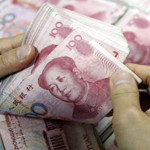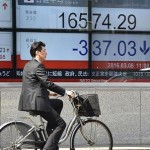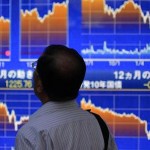Yen Retreats as Russian Stocks Gain After Crimea

The yen fell for the first time in six days against the dollar as a rally in Russian stocks damped concern Crimea’s vote to leave Ukraine will lead to an immediate increase in tensions between Russia and the West.
Japan’s currency weakened versus all of its 16 major counterparts as Royal Bank of Scotland Group Plc said the Bank of Japan may be embarking on dovish rhetoric, helping to cap recent gains in the currency. China’s yuan slid to an 11-month low versus the dollar after the central bank widened its trading band. The Australian dollar strengthened after Westpac Banking Corp. dropped its forecast for more interest-rate cuts. A gauge of currency volatility declined.
“We’re waiting to see what the response will be from the European Union, what the response from the United States is,” David Bloom, head of global currency strategy at HSBC Holdings Plc in London, said in an interview on Bloomberg Television’s “The Pulse,” with Francine Lacqua and Guy Johnson. The currency “market seems to be very calm. The market is not joining the dots and saying there’s a global problem. The market’s saying these are local isolated problems.”
The yen depreciated 0.4 percent to 101.78 per dollar as of 7:03 a.m. New York time after strengthening 1.9 percent last week. Japan’s currency dropped 0.3 percent to 141.47 per euro, the biggest decline since March 7. The euro weakened 0.1 percent to $1.3899.
Volatility Declines
The JPMorgan G7 Volatility Index dropped seven basis points, or 0.09 percentage point, to 7.51 percent after climbing 25 basis points last week.
A total of 96.8 percent of voters in the Crimea yesterday backed leaving Ukraine to join Russia, the head of the election commission, Mikhail Malyshev, told reporters. The Ukrainian government, the European Union and the U.S. consider the vote illegal, while Russia said it “fully met international norms.”
“We continue to focus on the details about the Western sanctions and Russia’s response to them,” said Yuji Saito, director of foreign-exchange at Credit Agricole Corporate & Investment Bank in Tokyo. “The market will be whipsawed as political games continue.”
The Micex gauge of Russian shares advanced 3.2 percent after slumping 7.6 percent last week.
EU foreign ministers are meeting in Brussels today to discuss travel bans and asset freezes on some Russian officials as Vladimir Putin’s government prepares to annex Crimea.
Yen’s Slide
The yen has declined 7.3 percent this year, according to Bloomberg Correlation-Weighted Indexes that track 10 developed-nation currencies. The dollar fell 0.2 percent, while the euro strengthened 6.8 percent.
BOJ Governor Haruhiko Kuroda said the central bank will adjust monetary policy without hesitation if it foresees a situation where achieving its inflation target would be difficult, the Asahi newspaper reported on March 15, citing an interview. He reiterated the pledge today in parliament.
The yuan fell for a second day after the People’s Bank of China said on March 15 the currency will be able to trade as much as 2 percent on either side of a daily central bank reference rate, from 1 percent previously.
The decision underscores pledges from China’s leaders to make the exchange rate more market based and promote freer movement of capital for investment purposes.
The onshore spot rate declined 0.5 percent to close at 6.1781 per dollar after declining to 6.1818, the weakest level since April 22.
“Volatility definitely spiked on a wider band while market sentiment is still leaning toward a weaker exchange rate on domestic financial risks and economic data,” said Nathan Chow, an economist at DBS Group Holdings Ltd. in Hong Kong.
Aussie Gains
The Australian dollar strengthened versus all of its major peers Westpac’s chief economist Bill Evans predicted the central bank will start increasing interest rates in the third quarter of next year.
“The forecast is now for flat rates throughout 2014,” Evans, who was the first to call the RBA’s latest easing cycle, wrote today in a research note. Better data on employment, consumption and business confidence will combine “to exclude a sufficiently strong case to cut rates,” the note said.
The Aussie rose 0.5 percent to 90.74 U.S. cents, the biggest advance since March 6.
(By Masaki Kondo and Lucy Meakin)
Source: bloomberg





























